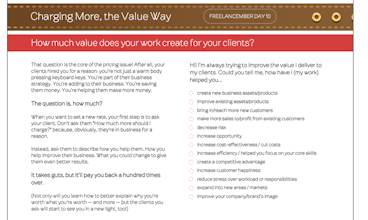
Freelancember
31 days of free gifts for freelancers
1 follower
31 days of free gifts for freelancers
1 follower
Freelancember is a collection of 31 gifts for freelancers, one for each day. Templates, checklists, guides how to get better clients, raise your rates, etc. By Amy Hoy, creator of Noko Time Tracking, former freelancer and consultant to startups, Pepsi, Ford.






Freelancember
Freelancember
Freelancember